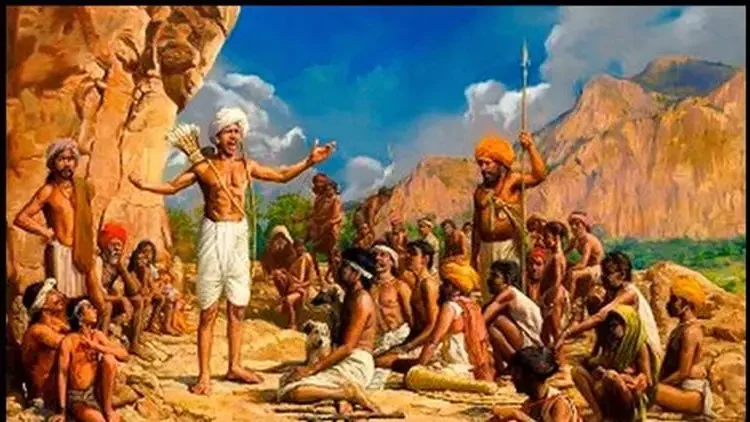Born In Ulihatu : Also known as (Birsa Bhagwan) or Birsa Biruli , was a visionary leader, a freedom fighter, and a social reformer who dedicated his life to fighting against the oppressive British colonial rule and championing the rights of the marginalized tribal communities in India. Born on November 15, 1875, in the village of Ulihatu, in what is now Jharkhand, Birsa Munda emerged as a prominent figure in the late 19th century, inspiring a movement for justice and equality that resonates to this day.
From an early age, Birsa Munda witnessed the exploitation and suffering endured by his people, the Munda tribe, who were dispossessed of their lands, subjected to heavy taxation, and forced into labor by the British Raj. Determined to bring about change, Birsa Munda started mobilizing his community and challenging the oppressive system. He became a beacon of hope, uniting various tribal groups and fostering a sense of collective identity and resistance.
Birsa Munda’s influence quickly spread beyond his own community. He travelled extensively, rallying support from other tribes and forming alliances with like-minded leaders. His charismatic personality, combined with his deep understanding of the socio-economic and political conditions, made him a formidable force against the British rule. He advocated for tribal rights, equal treatment under the law, and the restoration of ancestral lands.
One of the defining moments in Birsa Munda’s struggle was the formation of the “Munda Rebellion” in 1899. It was a response to the introduction of the Chotanagpur Tenancy Act, which aimed to take away tribal land rights and empower landlords. Birsa Munda saw this as an egregious violation of the tribal people’s rights and led a series of protests and armed resistance against the implementation of the Act.
The rebellion, though suppressed by the British authorities, marked a turning point in the fight for tribal rights. It brought the issues faced by the indigenous communities to the forefront of the national consciousness and served as a catalyst for future movements advocating for tribal autonomy and self-determination. Birsa Munda’s legacy as a freedom fighter and social reformer lives on through the struggles of various tribal communities striving for justice and equality in India.
In addition to his political activism, Birsa Munda also sought to reform the social and cultural fabric of his society. He challenged the prevailing social norms that perpetuated discrimination and exploitation within tribal communities. Birsa Munda promoted education among his people, advocating for the establishment of schools and emphasizing the importance of literacy. He encouraged his followers to embrace their cultural heritage while also promoting unity among different tribal groups.
Tragically, Birsa Munda’s life was cut short at the age of 25 when he was arrested by the British authorities in 1900. He was charged with sedition and died under mysterious circumstances while in custody. Despite his untimely death, Birsa Munda’s impact on the Indian freedom struggle and the rights of tribal communities cannot be overstated.
Birsa Munda’s vision and sacrifice continue to inspire generations. His relentless pursuit of justice, equality, and dignity for all remains a guiding light for those fighting against oppression and discrimination. His contributions to the tribal rights movement and his unwavering commitment to the principles of freedom and social justice have earned him a place among the greatest heroes of Indian history.
Born In Ulihatu As National Hero
Today, Birsa Munda is celebrated as a national hero in India, particularly in Jharkhand, where his birthplace has been transformed into a memorial site. His name is synonymous with the indomitable spirit of resistance and the unwavering struggle for the rights of marginalized communities. The legacy of Birsa Munda serves as a constant reminder that true freedom is achieved not only through political independence but also through the empowerment and upliftment of all sections of society.
In conclusion, Birsa Munda’s life and work stand as a testament to the power of one individual to challenge injustice and inspire change. His unwavering commitment to the rights of tribal communities and his fearless pursuit of justice continue to inspire people around the world. Birsa Munda’s legacy reminds us that the fight for equality and freedom is an ongoing struggle, and his life serves as a beacon of hope for all those striving to create a more just and equitable society.
Also Read : Skilled Professionals moving Overseas Number on the Rise

